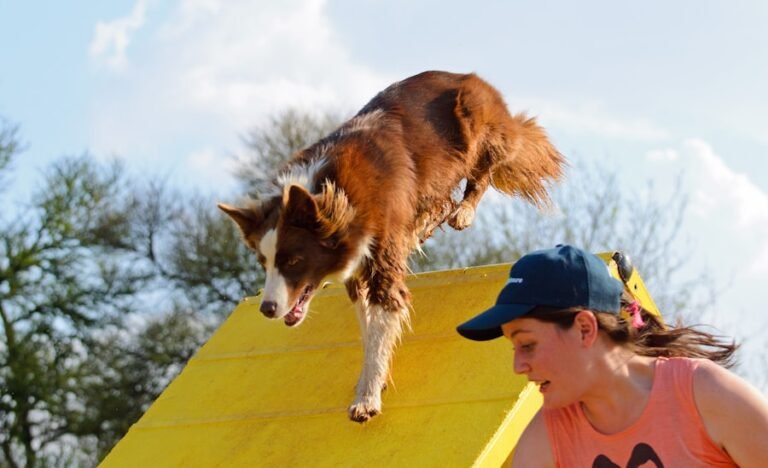Border Collies and Separation Anxiety: Tips for a Stress-Free Solo Experience
Border Collies are known for their intelligence, agility, and herding abilities. They are highly energetic and require plenty of mental and physical stimulation to thrive. However, along with their many positive traits, Border Collies are also prone to separation anxiety. This article will explore the causes of separation anxiety in Border Collies, how to identify the signs, and provide tips on prevention and management.
Understanding Border Collies and Separation Anxiety
Separation anxiety is a condition in which a dog becomes distressed when separated from their owner or left alone. It can manifest in various ways, such as excessive barking, destructive behavior, pacing, or even self-harm. Border Collies are particularly susceptible to separation anxiety due to their strong attachment to their owners and their need for constant mental and physical stimulation.
Identifying the Signs of Separation Anxiety in Border Collies
Border Collies with separation anxiety may exhibit a range of behaviors when left alone. These can include excessive barking or howling, destructive chewing or digging, pacing or restlessness, urinating or defecating indoors, or attempting to escape from the house or yard. It’s important to note that these behaviors can also be indicative of other behavioral issues or medical conditions, so it’s essential to rule out any underlying health problems before assuming it is separation anxiety.
Causes of Separation Anxiety in Border Collies
There are several factors that can contribute to the development of separation anxiety in Border Collies. One possible cause is a genetic predisposition, as certain breeds are more prone to anxiety disorders. Additionally, a lack of socialization during the critical developmental period can make dogs more susceptible to separation anxiety. Traumatic experiences, such as being abandoned or experiencing a significant life change like the loss of a family member, can also trigger separation anxiety. Lastly, changes in routine or environment can disrupt a Border Collie’s sense of security and trigger anxiety when left alone.
How to Prevent Separation Anxiety in Border Collies
Prevention is always better than treatment when it comes to separation anxiety. Early socialization and training are crucial in helping Border Collies develop confidence and independence. Gradual exposure to being alone can also help them become accustomed to being separated from their owners. Establishing a consistent routine and environment can provide a sense of security and stability for Border Collies, reducing the likelihood of separation anxiety.
Training Techniques to Help Border Collies Cope with Separation Anxiety
When it comes to managing separation anxiety in Border Collies, training techniques can be highly effective. Desensitization and counterconditioning involve gradually exposing the dog to being alone while providing positive reinforcement for calm behavior. Crate training can also be beneficial, as it provides a safe and secure space for the dog when left alone. Interactive toys and puzzles can help keep Border Collies mentally stimulated and distracted while their owners are away.
Creating a Comfortable Environment for Your Border Collie
Creating a comfortable environment for your Border Collie can help alleviate their anxiety when left alone. Provide them with a safe and secure space, such as a designated area or crate, where they can retreat to when feeling anxious. Introducing comforting scents and sounds, such as lavender or classical music, can also help create a calming atmosphere. Ensure that your dog has access to food, water, and toys to keep them occupied while you’re away.
Using Positive Reinforcement to Build Confidence in Your Border Collie
Positive reinforcement is a powerful tool in building confidence and reducing anxiety in Border Collies. Reward-based training methods, such as clicker training or treats for good behavior, can help reinforce positive associations with being alone. Encouraging independence by gradually increasing the time spent apart from your dog can also help build their confidence. Building trust and bonding through regular training sessions and quality time together can further strengthen the bond between you and your Border Collie.
The Importance of Exercise and Mental Stimulation for Border Collies
Border Collies are highly active dogs that require plenty of exercise and mental stimulation to prevent boredom and anxiety. Daily exercise and playtime, such as long walks, runs, or engaging in activities like agility or flyball, can help burn off excess energy and keep them physically fit. Mental stimulation through training sessions, puzzle toys, or interactive games can also tire out their minds and provide a healthy outlet for their intelligence.
Managing Separation Anxiety in Border Collies While You’re Away
If you need to leave your Border Collie alone for extended periods, there are several options to help manage their separation anxiety. Hiring a pet sitter or dog walker can provide companionship and break up the time spent alone. Doggy daycare facilities can also be a great option for socialization and mental stimulation while you’re away. Leaving comforting items, such as a favorite blanket or an article of clothing with your scent, can also help provide a sense of security for your dog.
Seeking Professional Help for Severe Separation Anxiety in Border Collies
In severe cases of separation anxiety, it may be necessary to seek professional help. If your Border Collie’s anxiety is causing significant distress or interfering with their daily life, it’s important to consult with a veterinarian or a certified animal behaviorist. These professionals can assess the severity of the anxiety and develop a tailored treatment plan. Treatment options may include behavior modification techniques, medication, or a combination of both.
Tips for a Smooth Transition When Returning Home to Your Border Collie
When returning home after being away, it’s important to greet your Border Collie calmly to avoid reinforcing any anxious behavior. Avoid punishing your dog for any misbehavior that may have occurred while you were away, as this can worsen their anxiety. Instead, focus on gradually reintroducing them to their routine and providing plenty of positive reinforcement for calm behavior.
Separation anxiety is a common issue among Border Collies, but with patience, consistency, and the right training techniques, it can be managed effectively. Understanding the causes and signs of separation anxiety is crucial in addressing the issue early on. By providing a comfortable environment, using positive reinforcement, and ensuring your Border Collie receives plenty of exercise and mental stimulation, you can help them cope with their anxiety and lead a happy, balanced life. Remember, if the anxiety persists or worsens, don’t hesitate to seek professional help to ensure the well-being of your beloved Border Collie.









